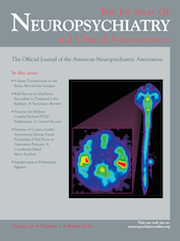To the Editor: Neuropsychiatric manifestations ranging from autistic symptoms, hyperkinesis, and rarely, psychosis are not uncommon in tuberous sclerosis. We report on an adolescent patient with tuberous sclerosis presenting as psychosis, which responded to treatment with trifluoperazine.
A 17-year-old Indian man presented for psychiatric consultation after an insidious onset of suspiciousness, irritability, self-muttering, socio-occupational decline, and poor self-care for a period of 2 months, without any major life event or stressor preceding these symptoms. Mental state revealed poor eye contact, decreased personal hygiene, blunted affect, delusions of reference and persecution, and auditory hallucinations. He had delayed developmental milestones and multiple episodes of generalized tonic–clonic seizures occurring at 2 years of age. Family history was negative for any neurological or psychiatric disorder. Physical examination showed adenoma sebaceum over nose and forehead, and Shagreen patch over his lower back. On investigations, CT scan of brain showed multiple calcified periventricular nodules; ultrasonography of abdomen revealed unilateral renal angiolipoma, and IQ testing revealed a mild level of intellectual deficit.
On the basis of the above clinical and neuroimaging findings, a diagnosis of tuberous sclerosis (TSC) with organic schizophrenia-like disorder (ICD−10) was made. He was begun on trifluperazine 15 mg/day and lorazepam 2 mg/day orally. On this regimen, his psychosis began gradually to improve and subsided over the next 2 months. He follows up regularly and remains asymptomatic for the past 2 years, allowing gradual tapering off of his psychotropic medications.
Discussion
Tuberous sclerosis, which is a phakomatosis involving skin, central nervous system (CNS), and multiple other systems, can occasionally present with behavioral disturbances. Our subject showed psychotic features with delusions and hallucinations which may result from tubers impinging upon various limbic structures and causing dopaminergic dysfunction. There are several reports of psychosis associated with tuberous sclerosis in adults.
1–5 Most commonly it is paranoid-hallucinatory type, which was also noted in our case. Psychotic symptoms are not uncommon in children with tuberous sclerosis; one study on 90 children reported more than 50% having psychotic behavior.
6 Among other neuropsychiatric manifestations of tuberous sclerosis, hyperkinesis and autistic symptoms are commonly reported.
6There was complete absence of a family history in the three preceding generations in our subject, which is unexpected in a disorder with an autosomal dominant transmission, thus raising possibilities of alternative genetic explanations, like random mutations or mosaicism in the case.
7 The choice of the medications in our case was based upon the fact that trifluperazine is less seizurogenic than other antipsychotics, such as clozapine and chlorpromazine, and thus would be less likely to precipitate seizure in an individual already vulnerable to them. Thus, the case sheds light upon the fact that TSC can present with psychotic features and highlights the need for a high index of suspicion to detect the disorder and manage it holistically by an effective liaison between the physician and psychiatrist.

